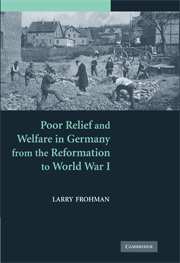Book contents
- Frontmatter
- Contents
- List of Tables and Figure
- Acknowledgments
- Introduction
- 1 Discipline, Community, and the Sixteenth-Century Origins of Modern Poor Relief
- 2 The Rise and Fall of the Workhouse: Poor Relief in the Age of Absolutism
- 3 Pauperism, Moral Reform, and Visions of Civil Society, 1800–1870
- 4 The State, the Market, and the Organization of Poor Relief, 1830–1870
- 5 The Assistantial Double Helix: Poor Relief, Social Insurance, and the Political Economy of Poor Law Reform
- 6 New Voices: Citizenship, Social Reform, and the Origins of Modern Social Work in Imperial Germany
- 7 The Social Perspective on Poverty and the Origins of Modern Social Welfare
- 8 From Fault to Risk: Changing Strategies of Assistance to the Jobless in Imperial Germany
- 9 Youth Welfare and the Political Alchemy of Juvenile Justice
- 10 The Social Evolution of Poor Relief, the Crisis of Voluntarism, and the Limits of Progressive Social Reform
- 11 Family, Welfare, and (Dis)order on the Home Front
- 12 Wartime Youth Welfare and the Progressive Refiguring of the Social Contract
- Conclusion: The End of Poor Relief and the Invention of Welfare
- Sources and Abbreviations
- Index
- References
7 - The Social Perspective on Poverty and the Origins of Modern Social Welfare
Published online by Cambridge University Press: 17 July 2009
- Frontmatter
- Contents
- List of Tables and Figure
- Acknowledgments
- Introduction
- 1 Discipline, Community, and the Sixteenth-Century Origins of Modern Poor Relief
- 2 The Rise and Fall of the Workhouse: Poor Relief in the Age of Absolutism
- 3 Pauperism, Moral Reform, and Visions of Civil Society, 1800–1870
- 4 The State, the Market, and the Organization of Poor Relief, 1830–1870
- 5 The Assistantial Double Helix: Poor Relief, Social Insurance, and the Political Economy of Poor Law Reform
- 6 New Voices: Citizenship, Social Reform, and the Origins of Modern Social Work in Imperial Germany
- 7 The Social Perspective on Poverty and the Origins of Modern Social Welfare
- 8 From Fault to Risk: Changing Strategies of Assistance to the Jobless in Imperial Germany
- 9 Youth Welfare and the Political Alchemy of Juvenile Justice
- 10 The Social Evolution of Poor Relief, the Crisis of Voluntarism, and the Limits of Progressive Social Reform
- 11 Family, Welfare, and (Dis)order on the Home Front
- 12 Wartime Youth Welfare and the Progressive Refiguring of the Social Contract
- Conclusion: The End of Poor Relief and the Invention of Welfare
- Sources and Abbreviations
- Index
- References
Summary
The Social Perspective on Poverty and the Logic of Social Citizenship
The middle decades of the nineteenth century witnessed the creation of a system of poor relief and charity that was designed to consolidate the new bourgeois social order by molding the lower classes into those industrious, disciplined, and providential workers on whom this social formation was believed to depend. This assistantial regime was based on the combination of moral reform and the repressive promotion of self-reliance. However, beginning in the 1890s this regime was challenged by a new paradigm whose primary strategies were prevention and treatment, rather than deterrence. The basic form of social assistance provided under this new regime was known as “social relief” or “social welfare” (soziale Fürsorge), and both the political rationality that drove the development of these programs between 1900 and 1914 and the mechanisms of social intervention that they pioneered in order to achieve their preventive and therapeutic aims were soon to become defining features of the welfare state.
The history of the German welfare state in this period is an extraordinarily complex one that sprawls across the entire social landscape of imperial Germany, and it cannot easily be captured in a limited space. It developed at a number of different levels, each with its own logic and temporality, and it is important not to lose sight of the complexity, contradictoriness, and asynchronicity of the process even as we try to give the story a degree of conceptual and narrative unity.
- Type
- Chapter
- Information
- Publisher: Cambridge University PressPrint publication year: 2008



